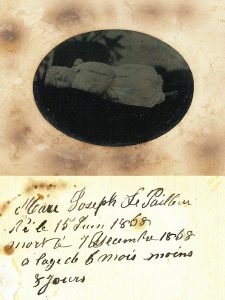Women also contributed to history
In the 19th and 20th centuries, the LePailleur women made history

Several women are descended from Michel LePailleur and Catherine Jérémie. Here, each leaf personifies one of them.
In the history of Quebec, as in many other patriarchal societies, biographies of women are much fewer than those of men. Yet, although usually behind the scenes, women have been very much involved in the development of the communities in which they lived.
The matriarch Catherine LePailleur, née Jérémie, was an educated woman committed to her community who paved the way for her descendants. Fortunate enough to come from wealthy backgrounds that gave them access to a good education and connect them with men of letters, they in turn contributed to the betterment of their community.
Over generations, the LePailleur women have played classic bourgeoisie-related roles and, like many women at the time, they have experienced their share of grief. During the 18th, 19th and early 20th centuries, children often perished at an early age. Poor hygiene standards and the lack of pasteurization and vaccination made toddlers even more vulnerable. Although the LePailleur women have been fortunate enough to enjoy good living conditions, they were not immune to these losses: between 1722 and 1910, over 40 children, out of a hundred births, died before the age of 5.

Agnès LePailleur, Provincial Superior of the Grey Nuns of Montreal and a newspaper clipping mentioning her death (1951).
Most LePailleur women who wanted a career had no choice but to enter religion. Whether they were nurses or teachers or cared for the poor, they were able to work by joining religious communities, sometimes even reaching senior positions.
Very few of the female descendants of Catherine marked history. The best known is Marie-Rose Descarries, daughter of politician Joseph-Adélard and granddaughter of notary Alfred-Narcisse LePailleur. Marie-Rose chose a career in music and became a singer, known particularly for her role as Gemma in the opera L’Intendant Bigot (1929) and for her many radio appearances.
Whether through religion, music, herbalism or the strong family and community values they advocated, the LePailleur women took part in the development of Quebec from the time of New France.




